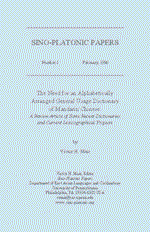 | |
| Discipline | Asian studies, Sinology |
|---|---|
| Language | Multilingual |
| Edited by | Victor H. Mair |
| Publication details | |
| History | 1986-present |
| Publisher | Department of East Asian Languages and Civilizations, University of Pennsylvania (United States) |
| Yes | |
| License | Creative Commons Attribution-NonCommercial-NoDerivs 2.5 License |
| Standard abbreviations | |
| ISO 4 | Sino-Platonic Pap. |
| Indexing | |
| ISSN | 2157-9679 (print) 2157-9687 (web) |
| LCCN | 2010203477 |
| OCLC no. | 213506013 |
| Links | |
Sino-Platonic Papers is a scholarly monographic series published by the University of Pennsylvania. The chief focus of the series is on the intercultural relations of China and Central Asia with other peoples. The journal was established in 1986 by Victor H. Mair, to publish and encourage "unconventional or controversial" research by "younger, not yet well established, scholars and independent authors".[1]
Issues 1 (November 1986) through 170 (February 2006) were published in traditional printed format, but beginning with issue 171 (June 2006), Sino-Platonic Papers has been published electronically only. All new issues, and old ones that are no longer in print, are provided free in PDF format, under the Creative Commons Attribution-NonCommercial-NoDerivs 2.5 License.
The Warring States Project, at the University of Massachusetts Amherst, called changing this journal's publication format to open access "an explicit challenge to the gatekeepers whose chief role is to keep the lid on."[1]
YouTube Encyclopedic
-
1/3Views:2 052 0141 200 985227 590
-
Plato’s Allegory of the Cave - Alex Gendler
-
Choice, happiness and spaghetti sauce | Malcolm Gladwell
-
How Does Your Phone Know This Is A Dog?
Transcription
What is reality, knowledge, the meaning of life? Big topics you might tackle figuratively explainIing existence as a journey down a road or across an ocean, a climb, a war, a book, a thread, a game, a window of opportunity, or an all-too-short-lived flicker of flame. 2,400 years ago, one of history's famous thinkers said life is like being chained up in a cave, forced to watch shadows flitting across a stone wall. Pretty cheery, right? That's actually what Plato suggested in his Allegory of the Cave, found in Book VII of "The Republic," in which the Greek philosopher envisioned the ideal society by examining concepts like justice, truth and beauty. In the allegory, a group of prisoners have been confined in a cavern since birth with their backs to the entrance, unable to turn their heads, and with no knowledge of the outside world. Occasionally, however, people and other things pass by the cave opening, casting shadows and echos onto the wall the captives face. The prisoners name and classify these illusions, believing they're perceiving actual entities. Suddenly, one prisoner is freed and brought outside for the first time. The light hurts his eyes and he finds the new environment disorienting. When told that the things around him are real, while the shadows were mere reflections, he cannot believe it. The shadows appeared much clearer to him. But gradually, his eyes adjust until he can look at reflections in the water, at objects directly, and finally at the Sun, whose light is the ultimate source of everything he has seen. The prisoner returns to the cave to share his discovery, but he is no longer used to the darkness, and has a hard time seeing the shadows on the wall. The other prisoners think the journey has made him stupid and blind, and violently resist any attempts to free them. Plato introduces this passage as an analogy of what it's like to be a philosopher trying to educate the public. Most people are not just comfortable in their ignorance but hostile to anyone who points it out. In fact, the real life Socrates was sentenced to death by the Athenian government for disrupting the social order, and his student Plato spends much of "The Republic" disparaging Athenian democracy, while promoting rule by philosopher kings. With the cave parable, Plato may be arguing that the masses are too stubborn and ignorant to govern themselves. But the allegory has captured imaginations for 2,400 years because it can be read in far more ways. Importantly, the allegory is connected to the theory of forms, developed in Plato's other dialogues, which holds that like the shadows on the wall, things in the physical world are flawed reflections of ideal forms, such as roundness, or beauty. In this way, the cave leads to many fundamental questions, including the origin of knowledge, the problem of representation, and the nature of reality itself. For theologians, the ideal forms exist in the mind of a creator. For philosophers of language viewing the forms as linguistic concepts, the theory illustrates the problem of grouping concrete things under abstract terms. And others still wonder whether we can really know that the things outside the cave are any more real than the shadows. As we go about our lives, can we be confident in what we think we know? Perhaps one day, a glimmer of light may punch a hole in your most basic assumptions. Will you break free to struggle towards the light, even if it costs you your friends and family, or stick with comfortable and familiar illusions? Truth or habit? Light or shadow? Hard choices, but if it's any consolation, you're not alone. There are lots of us down here.
References
- ^ a b Sinological Journals: Sino-Platonic Papers Archived 2007-01-03 at the Wayback Machine, Warring States Project, University of Massachusetts, Amherst
External links
